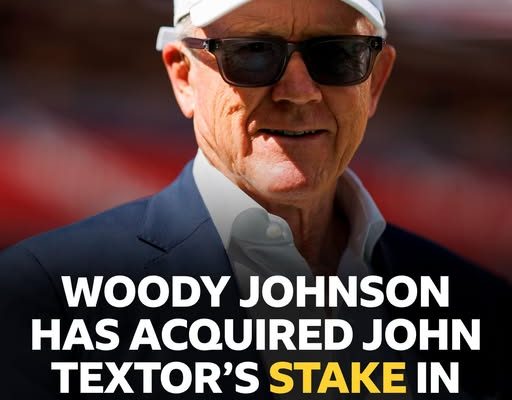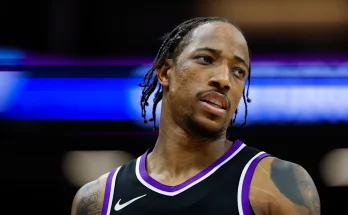In one of the most compelling cross-continental sports business moves in recent memory, New York Jets owner Woody Johnson has officially completed his acquisition of John Textor’s 43% stake in Crystal Palace Football Club. This bold financial and strategic maneuver now places Johnson in a major position of influence at one of the English Premier League’s most historic clubs, signaling not only his deepening interest in global sports but a potential shift in the dynamics of Crystal Palace’s ownership and long-term aspirations. For the Premier League, this development is part of a growing trend where American investors are increasingly finding both value and opportunity in English football, and for Johnson, it marks his latest foray into the global sporting arena.
The purchase comes after months of speculation surrounding John Textor’s desire to streamline his football portfolio. Textor, who also owns stakes in Olympique Lyonnais in France, Botafogo in Brazil, and RWD Molenbeek in Belgium under the umbrella of Eagle Football Holdings, had become a central figure in multi-club ownership models. His involvement with Crystal Palace had been productive, yet complicated by his ambitions to consolidate his other football holdings into a tighter strategic vision. As it became clear that a divestment was imminent, all eyes turned to who might step up to acquire one of the more significant stakes in a Premier League club. Woody Johnson, already a high-profile figure due to his ownership of the New York Jets and former ambassador to the United Kingdom under President Donald Trump, emerged as the perfect candidate.
Johnson’s personal and professional ties to the UK, developed during his ambassadorship from 2017 to 2021, likely played a role in his interest. His experience working closely with British government officials and business leaders gave him an inside look into the country’s culture and its most beloved sport—football. With his background in NFL ownership and his extensive business acumen as heir to the Johnson & Johnson fortune, Johnson brings both financial muscle and operational know-how to the Crystal Palace boardroom. The move could herald a new era for Palace, a club long known for its passionate fanbase, storied history, and a knack for punching above its weight in England’s top flight.
For Crystal Palace, the shift in ownership comes at a pivotal time. The club has spent several years solidifying its status in the Premier League under steady leadership, with a mix of veteran and youthful players providing balance on the pitch. With Roy Hodgson’s recent departure and the arrival of new managerial blood, Palace has quietly entered a phase of transition. Financial security and strategic clarity are more important than ever. With Johnson’s entry into the ownership group, Palace could benefit from increased investment in scouting, youth development, infrastructure, and international marketing. The potential exists for the club to not only sustain its Premier League presence but evolve into a genuine top-half challenger—something fans have yearned for.
However, this new chapter is not without its uncertainties. Johnson will be joining a consortium that includes longtime Palace supporters Steve Parish, Josh Harris, and David Blitzer. The balance of power within the ownership group could see a subtle shift depending on Johnson’s ambitions and approach. His recent remarks have emphasized a commitment to stability and respect for the club’s culture, but fans will be watching closely to see if his NFL sensibilities influence football operations. American ownership in the Premier League is no longer novel, but it remains a sensitive issue for many supporters wary of foreign influence diluting the identity of their clubs.
Crystal Palace, in particular, occupies a unique space in English football. Based in South London, the club has a fiercely loyal local following and a reputation for developing homegrown talent. Recent years have seen the emergence of players like Wilfried Zaha and Eberechi Eze, who embody both the club’s grassroots ethos and its potential to be a springboard to stardom. Johnson’s challenge will be to preserve this identity while also helping the club modernize and grow. The potential synergies between his NFL knowledge and the demands of Premier League competition could result in innovative practices, from sports science to digital fan engagement to stadium upgrades.
What also makes Johnson’s acquisition particularly intriguing is the broader landscape of American investment in the Premier League. With owners like Todd Boehly at Chelsea, the Glazer family at Manchester United, and Stan Kroenke at Arsenal, there is a growing belief that American capital sees England’s top league not only as a business opportunity but a platform for international influence. The Premier League’s global reach, lucrative media rights, and year-round attention provide the kind of brand exposure that aligns perfectly with American-style sports ownership. Johnson’s move fits neatly into this trend but also stands apart in terms of its narrative—a former U.S. ambassador returning to British soil not with a diplomatic mission, but a sporting vision.
For John Textor, the sale represents a strategic withdrawal rather than a retreat. He remains deeply involved in football through his other clubs and continues to push for a connected vision of global football under Eagle Football Holdings. Textor has faced criticism for some of his moves, especially at Lyon and Botafogo, but his passion for the sport and belief in the multi-club model are undeniable. His exit from Palace simplifies his portfolio and allows him to double down on other priorities. While some Palace fans may be relieved at the departure of a more globally distracted investor, others may worry about losing a visionary thinker who saw the club as part of a broader footballing ecosystem.
There’s also the question of how Johnson’s involvement might influence Palace’s operations in the U.S. market. With his deep NFL ties and brand recognition stateside, Johnson is uniquely positioned to help the club build its American presence. Whether that means pre-season tours, youth academy partnerships, or merchandising initiatives, Palace could soon find itself more prominently featured in the American sports consciousness. This move could also deepen the links between the NFL and Premier League, especially as both leagues explore ways to grow globally. It’s not inconceivable that Johnson could use his dual ownership roles to foster crossover promotions, talent exchanges, or collaborative ventures.
As the deal becomes finalized, fans and analysts alike will keep a close eye on Johnson’s early moves. His track record with the New York Jets has been a mixed bag, characterized by moments of promise and periods of underachievement. Critics have pointed to managerial instability and poor draft decisions as areas where his leadership could have been stronger. However, supporters of Johnson argue that he is a patient, long-term thinker willing to invest heavily in the right people and infrastructure. If he applies the same level of commitment to Crystal Palace, the club could find itself on firmer footing heading into the next decade of Premier League competition.
In many ways, this acquisition is a symbol of the changing nature of global sports ownership. No longer confined by borders or traditional roles, owners like Johnson are carving out new paths that blend personal passion, geopolitical awareness, and financial ambition. The implications for Crystal Palace are wide-ranging, from financial stability to broader brand visibility. But most of all, the move signifies belief—belief in the club’s potential, in the Premier League’s enduring appeal, and in the power of football to unite people across oceans.
Only time will tell whether Woody Johnson’s stake in Crystal Palace becomes a footnote in the club’s history or the beginning of a transformative era. What is clear is that the eyes of South London, the Premier League, and indeed the global sporting community will be watching closely. This is more than just a business transaction—it’s a power move with the potential to reshape the destiny of a proud football club.



